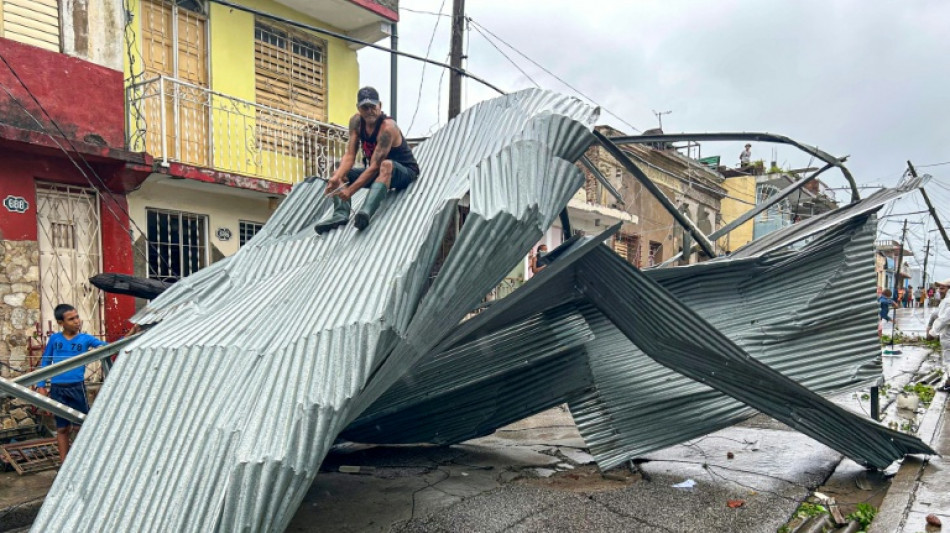
Caribbean reels from hurricane as homes, streets destroyed

Cubans waded through flooded houses Wednesday and authorities in Haiti reported 10 dead as Hurricane Melissa blasted across the Caribbean after devastating swaths of Jamaica.
The storm made landfall in Cuba overnight, with the US National Hurricane Center (NHC) describing it as "extremely dangerous" even if starting to weaken.
"It has been a very difficult early morning," Cuban President Miguel Diaz-Canel said.
"Extensive damage, and Hurricane Melissa is still over Cuban territory," he posted on social media. "I urge our people not to let their guard down, to maintain discipline, and to remain safely sheltered."
Residents in the east of the communist island struggled through flooded homes and inundated streets, with windows smashed, power cables downed and roofs torn off.
AFP reporters in the city of Santiago de Cuba reported that winds were still intense on Wednesday morning and streets were full of tree branches, roof tiles, downed power poles and other debris.
The major hotel in the city had its glass windows shattered and some roof parts brought down.
Hurricane Melissa had hit with maximum sustained winds of 120 miles (195 kilometers) per hour, the NHC said, after fluctuating between Category 3 and Category 5, the highest on the Saffir-Simpson scale.
Cuban authorities declared a "state of alert" in six eastern provinces.
- 'Disaster area' -
At least 10 people in Haiti were killed in floods caused by the hurricane, local authorities told AFP on Wednesday.
The La Digue River, in the coastal town of Petit-Goave, overflowed its banks, sweeping away several people.
Hurricane Melissa tied the 1935 record for the most intense storm ever to make landfall when it battered Jamaica on Tuesday, according to data from the US National Oceanic and Atmospheric Administration (NOAA).
Jamaican Prime Minister Andrew Holness declared the island a "disaster area" and authorities warned residents of continued flooding and the risk of landslides.
Lisa Sangster, a 30-year-old communications specialist in Kingston, said her home was devastated by the storm.
"My sister... explained that parts of our roof was blown off and other parts caved in and the entire house was flooded," she told AFP.
Cuban families on Tuesday had trekked along narrow paths slick with mud and fringed by dense greenery to head to relative safety, carrying loved ones and a handful of quickly snatched belongings.
- Communications down -
In El Cobre, rescue workers were attempting to reach 17 people trapped by rising floodwaters and a landslide, according to state media.
"We are safe and trying to stay calm," rheumatologist Lionnis Francos, one of those stranded, told the official news site Cubadebate.
Two children, five elderly people, asthmatics, and people with high blood pressure are among those trapped.
"The rescuers arrived quickly. They called us, but couldn't cross because the road is blocked," the doctor added.
The full scale of Melissa's damage was not yet clear. A comprehensive assessment could take days with communications networks badly disrupted across the region.
Jamaican government minister Desmond McKenzie said several hospitals had been damaged, including in Saint Elizabeth, a coastal district he said was "underwater."
Mathue Tapper, 31, told AFP from Kingston that those in the capital were "lucky" but feared for fellow Jamaicans in the island's more rural western areas.
Due to climate change, warmer sea surface temperatures inject more energy into storms, giving them extra fuel.
As the ocean surface warms, the frequency of the most intense cyclones, with stronger winds and more precipitation, increases.
"Human-caused climate change is making all of the worst aspects of Hurricane Melissa even worse," said climate scientist Daniel Gilford.
The United Nations said Wednesday it had allocated $4 million each for Haiti and Cuba from its Central Emergency Response Fund and warned of major humanitarian needs triggered by the hurricane.
N.David--PS

 London
London

 Manchester
Manchester
 Glasgow
Glasgow
 Dublin
Dublin
 Belfast
Belfast
 Washington
Washington
 Denver
Denver
 Atlanta
Atlanta
 Dallas
Dallas
 Houston Texas
Houston Texas
 New Orleans
New Orleans
 El Paso
El Paso
 Phoenix
Phoenix
 Los Angeles
Los Angeles



